Unit 2 Sporting events Grammar and usage(1)情态动词课件(27张PPT)
文档属性
| 名称 | Unit 2 Sporting events Grammar and usage(1)情态动词课件(27张PPT) |
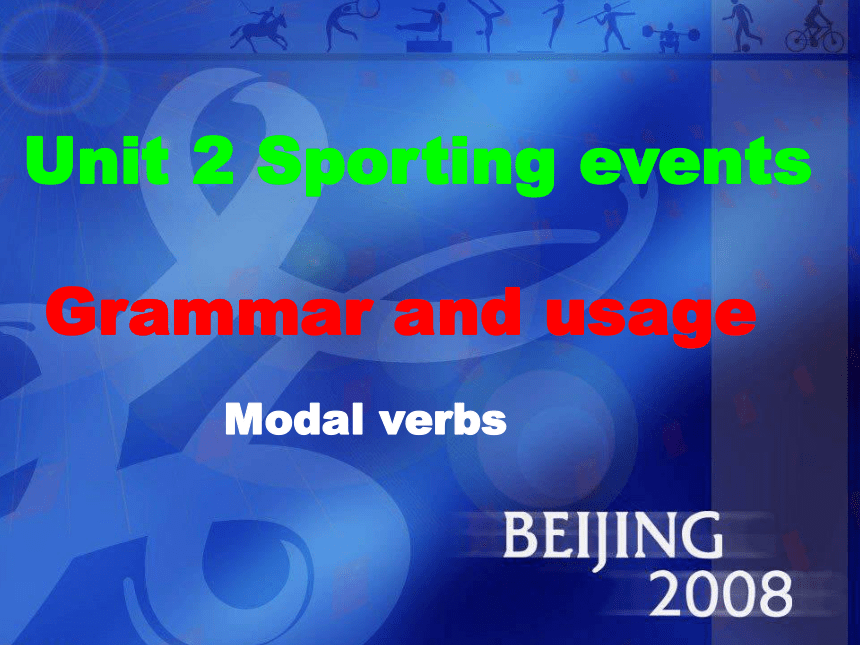
|
|
| 格式 | zip | ||
| 文件大小 | 160.7KB | ||
| 资源类型 | 教案 | ||
| 版本资源 | 牛津译林版 | ||
| 科目 | 英语 | ||
| 更新时间 | 2020-01-09 00:00:00 | ||
图片预览


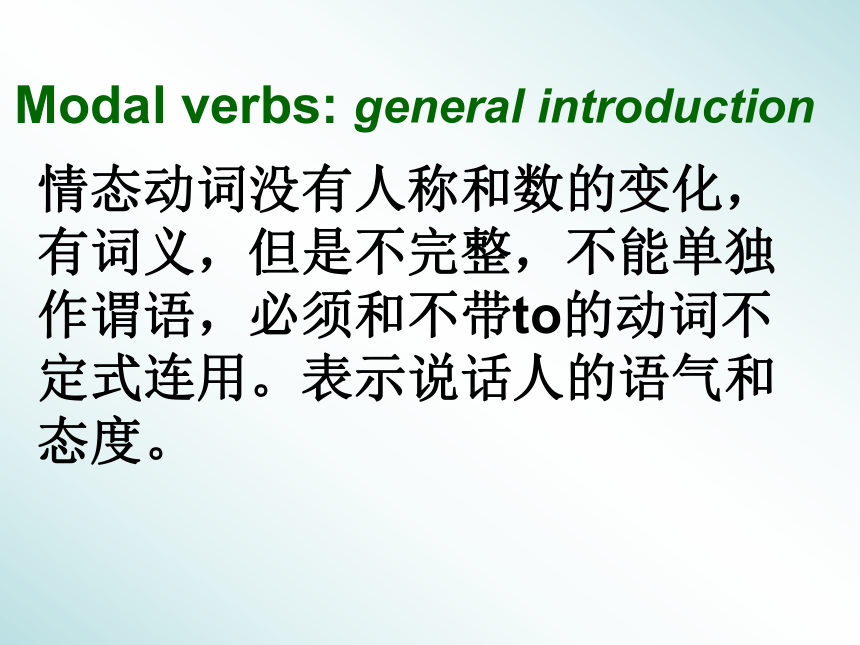
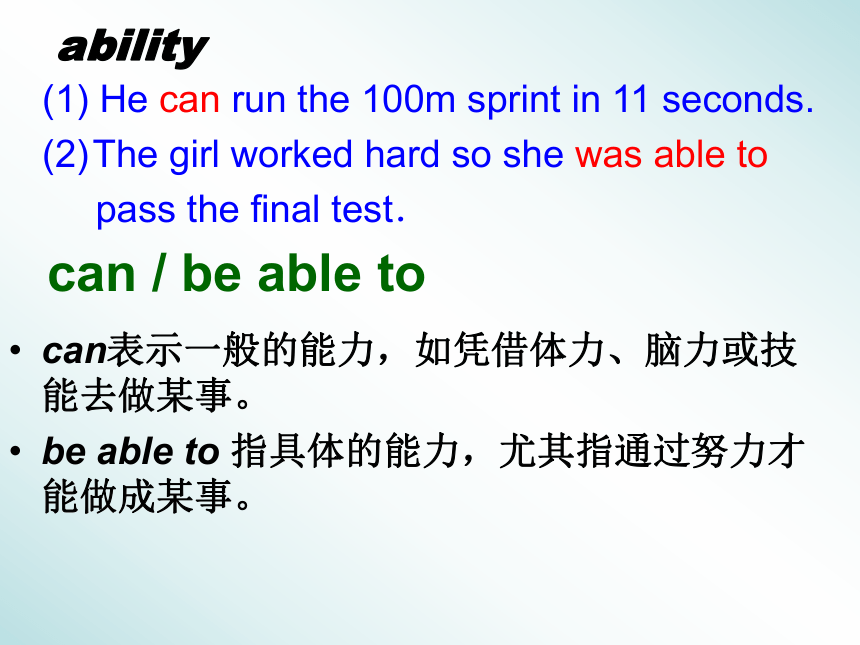
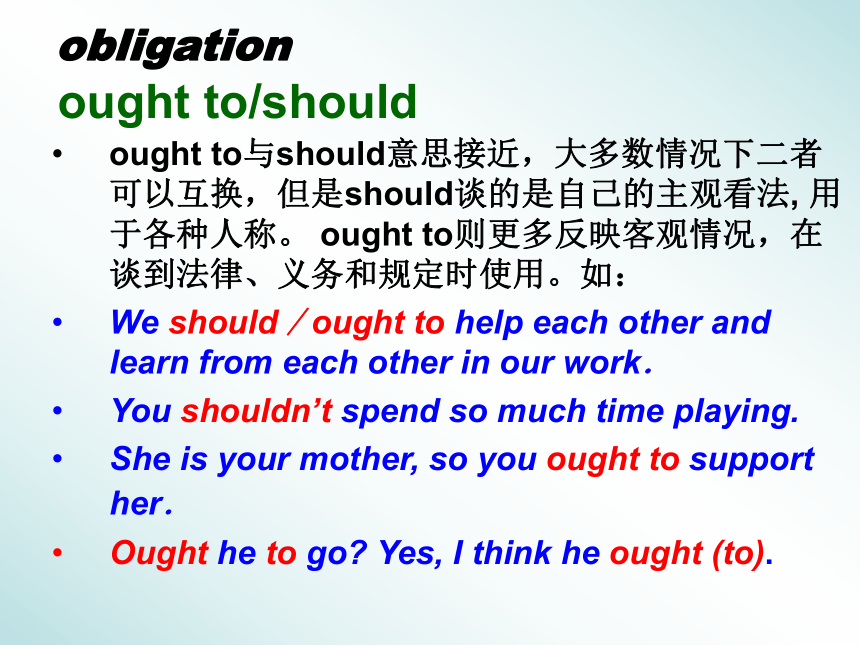
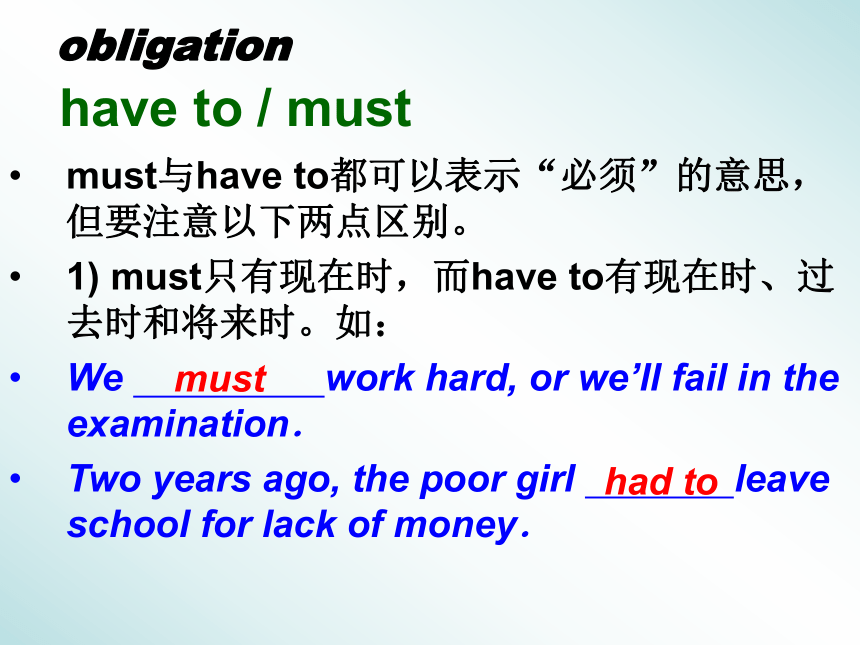
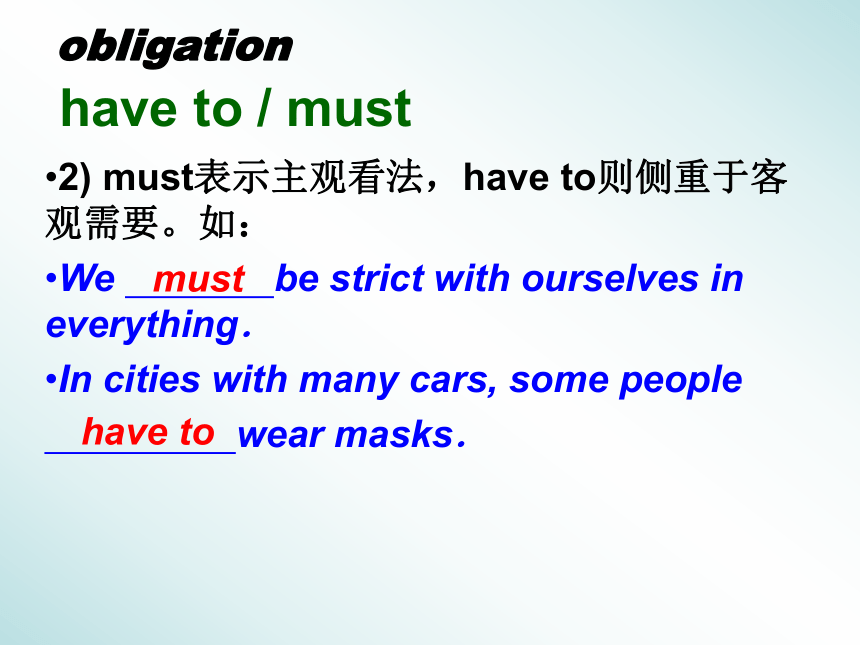
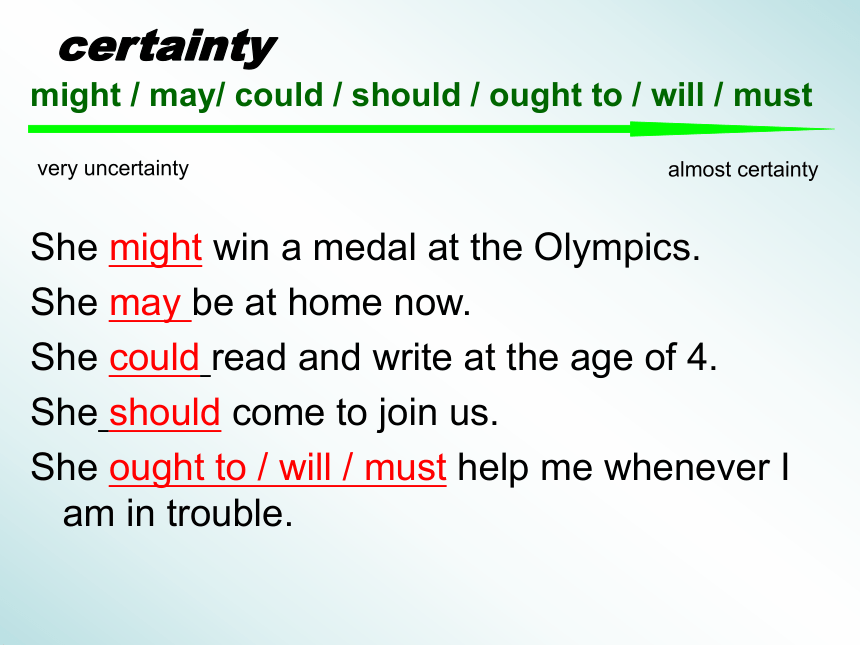
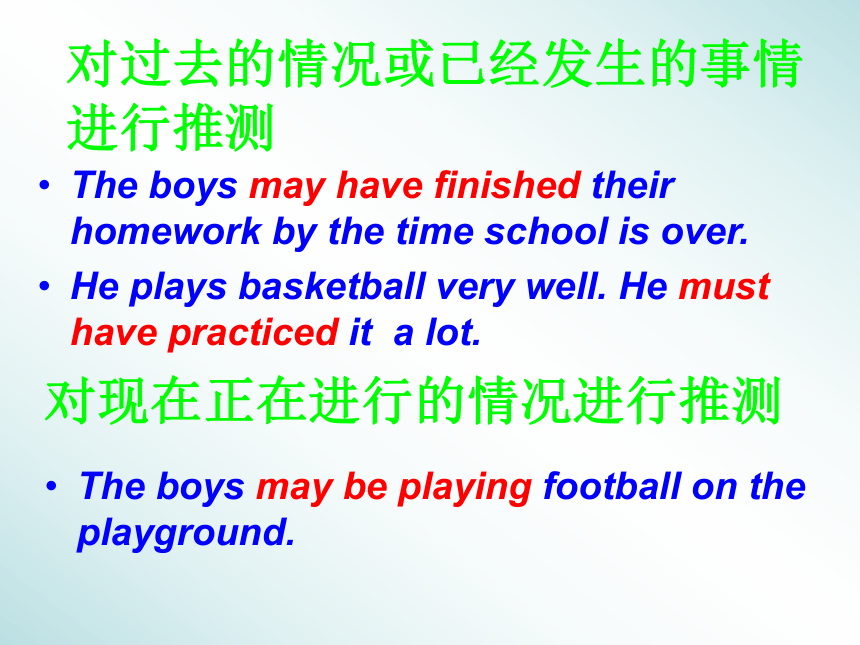
文档简介
课件27张PPT。Grammar and usageUnit 2 Sporting eventsModal verbs课件描述:
通过对情态动词的介绍来帮助学生学习掌握情态动词。
情态动词没有人称和数的变化,有词义,但是不完整,不能单独作谓语,必须和不带to的动词不定式连用。表示说话人的语气和态度。Modal verbs: general introduction(1) He can run the 100m sprint in 11 seconds.
(2) The girl worked hard so she was able to
pass the final test.
abilitycan表示一般的能力,如凭借体力、脑力或技能去做某事。
be able to 指具体的能力,尤其指通过努力才能做成某事。can / be able toobligationought to/shouldought to与should意思接近,大多数情况下二者可以互换,但是should谈的是自己的主观看法, 用于各种人称。 ought to则更多反映客观情况,在谈到法律、义务和规定时使用。如:
We should/ought to help each other and learn from each other in our work.
You shouldn’t spend so much time playing.
She is your mother, so you ought to support her.
Ought he to go? Yes, I think he ought (to).
have to / mustobligation
must与have to都可以表示“必须”的意思,但要注意以下两点区别。
1) must只有现在时,而have to有现在时、过去时和将来时。如:
We work hard, or we’ll fail in the examination.
Two years ago, the poor girl leave school for lack of money.
musthad to2) must表示主观看法,have to则侧重于客观需要。如:
We be strict with ourselves in everything.
In cities with many cars, some people
wear masks. obligationhave to / mustmusthave to She might win a medal at the Olympics.
She may be at home now.
She could read and write at the age of 4.
She should come to join us.
She ought to / will / must help me whenever I am in trouble.
certaintymight / may/ could / should / ought to / will / must very uncertaintyalmost certaintyThe boys may have finished their homework by the time school is over.
He plays basketball very well. He must have practiced it a lot.对过去的情况或已经发生的事情进行推测对现在正在进行的情况进行推测The boys may be playing football on the playground.表示虚拟语气should have done
shouldn’t have done
could have done
needn’t have done 本应该做而没做本不应该做而做了本可以做而没做本不必做而做了can / could / may / might could比can 更委婉,might比may 更委婉
—Can I watch the Olympics ?
—Yes, you can. No, you can’t.
—May I watch TV after finishing my homework?
—Yes, you may.
No, you / / .
permissioninformal / spokenformal / writtenmustn’tmay notyou’d better not—Will / Can/ Could/Would you help me with my training?
—Yes, I will/can/can/will.will / can / could / wouldmake requestsinformal formal make suggestionsshall常用于第一,三人称,表示征求对方意见。
— Shall we / I / he / she / they do some
exercise this morning?
— Yes.
— Shall he come in?
— Ok.willwill, would, used to
will 表示现在的习惯
would和used to 表示过去的习惯,但would 比used to 正式,used to表示过去常常做而现在已不再做了,而would没有这层含义。Police arrest criminals by firing nets instead of guns.
I still remember my happy childhood when my mother take me to Disneyland.
I go to the gym three times a week, but I don’t work out any more.wouldused to habitshall可以用来征求对方意见。用于第一、三人称。此外它也可以用来表示说话人的命令、警告、允诺、威胁或决心等,这时它用于第二、三人称。也可用于条约、规章制度等中,表示义务、规定。如:
Shall she go to the concert with us this evening?
You shall go to the front at once.
Don’t worry.You shall get the answer this very afternoon.
He shall be sorry one day.I tell you.
One of our rules is that every student shall wear school uniform while at school.shall / will征求意见命令允诺警告规定will在肯定句中表示意愿或决心时,是可以用于条件状语从句的。在疑问句中用于第二、三人称表示意愿。如:
Will you go hiking with me in the mountain?
Will he pay for me?
If you will listen to me, I’ll give you some advice on how to learn English.
If you will come this way, the manager will meet you.
shall / willmustn’t / needn’tmustn’t 解释为“不准,不许”,语气强烈;needn’t “不需要,没必要”,语气缓和。
You mustn’t miss this football match. It’s very important.
You needn’t watch the game if you don’t want to.
—Must we clean the classroom?
—Yes, you must. /No, you .needn’tneed / dare作为情态动词时,两个词常用于疑问句和否
定句。
—Need I help you?
—Yes, please.
You needn’t telephone him now.
How dare you talk to the teacher like that?
The girl dare not go out alone at night.
用作实义动词时,可用于各种句式,有人称、数和时态的变化,其后接带to 的动词不定式。
We need to tell him the news. You don’t need to tell him the news.
Do the flowers need watering?
I didn’t dare to tell you the truth.
Would you dare to catch the snake with your hand?
The boy dares to do anything he likes.need / dare特殊用法may 表示祝愿
must “偏要、硬要、非得”
can 表示可能性,“有时会”
will 表示倾向性
may/might as well “不妨、最好”
may well “很可能”
cannot /can’t ……too “越……越好,再……都不为过”Have a try! A left-luggage office is a place where bags
____be left for a short time, especially at a railway station.
A. should B. can C. must D. willB2. How ___ you say that you really understand
the whole story if you have covered only part
of the article?
A. can B. must C. need D. mayA3. —The room is so dirty. ____ we clean
it?
—Of course .
A. Will B. Shall C. Would D. Do B4. My English-Chinese dictionary has
disappeared. Who ___ have taken it?
A. should B. must C. could D. wouldC5. —I hear you’ve got a set of valuable
Australian coins.___ I have a look?
—Yes, certainly.
A. Do B. May C. Shall D. ShouldB6. I was really anxious about you. You
___ home without a word.
A. mustn’t leave B. shouldn’t have left
C. couldn’t have left D. needn’t leaveB7. —Are you coming to Jeff’s party?
—I’m not sure. I __ go to the concert
instead.
A. must B. would C. should D. mightD8. Sorry, I’m late. I ____ have turned
off the alarm clock and gone back to
sleep again.
A. might B. should C. can D. willA9. —When can I come for the photos? I
need them tomorrow afternoon.
—They ___ be ready by 12:00.
A. can B. should C. might D. needB10. The fire spread through the hotel
very quickly but everyone ____ get out.
A. had to B. would
C. was able to D. couldC11. When he was there, he ___ go to that
coffee shop at the corner after work
everyday.
A. would B. should
C. had better D. mightA12. I wonder how he __ that to the teacher.
A. dare to say B. dare saying
C. not dare say D. dared sayD
通过对情态动词的介绍来帮助学生学习掌握情态动词。
情态动词没有人称和数的变化,有词义,但是不完整,不能单独作谓语,必须和不带to的动词不定式连用。表示说话人的语气和态度。Modal verbs: general introduction(1) He can run the 100m sprint in 11 seconds.
(2) The girl worked hard so she was able to
pass the final test.
abilitycan表示一般的能力,如凭借体力、脑力或技能去做某事。
be able to 指具体的能力,尤其指通过努力才能做成某事。can / be able toobligationought to/shouldought to与should意思接近,大多数情况下二者可以互换,但是should谈的是自己的主观看法, 用于各种人称。 ought to则更多反映客观情况,在谈到法律、义务和规定时使用。如:
We should/ought to help each other and learn from each other in our work.
You shouldn’t spend so much time playing.
She is your mother, so you ought to support her.
Ought he to go? Yes, I think he ought (to).
have to / mustobligation
must与have to都可以表示“必须”的意思,但要注意以下两点区别。
1) must只有现在时,而have to有现在时、过去时和将来时。如:
We work hard, or we’ll fail in the examination.
Two years ago, the poor girl leave school for lack of money.
musthad to2) must表示主观看法,have to则侧重于客观需要。如:
We be strict with ourselves in everything.
In cities with many cars, some people
wear masks. obligationhave to / mustmusthave to She might win a medal at the Olympics.
She may be at home now.
She could read and write at the age of 4.
She should come to join us.
She ought to / will / must help me whenever I am in trouble.
certaintymight / may/ could / should / ought to / will / must very uncertaintyalmost certaintyThe boys may have finished their homework by the time school is over.
He plays basketball very well. He must have practiced it a lot.对过去的情况或已经发生的事情进行推测对现在正在进行的情况进行推测The boys may be playing football on the playground.表示虚拟语气should have done
shouldn’t have done
could have done
needn’t have done 本应该做而没做本不应该做而做了本可以做而没做本不必做而做了can / could / may / might could比can 更委婉,might比may 更委婉
—Can I watch the Olympics ?
—Yes, you can. No, you can’t.
—May I watch TV after finishing my homework?
—Yes, you may.
No, you / / .
permissioninformal / spokenformal / writtenmustn’tmay notyou’d better not—Will / Can/ Could/Would you help me with my training?
—Yes, I will/can/can/will.will / can / could / wouldmake requestsinformal formal make suggestionsshall常用于第一,三人称,表示征求对方意见。
— Shall we / I / he / she / they do some
exercise this morning?
— Yes.
— Shall he come in?
— Ok.willwill, would, used to
will 表示现在的习惯
would和used to 表示过去的习惯,但would 比used to 正式,used to表示过去常常做而现在已不再做了,而would没有这层含义。Police arrest criminals by firing nets instead of guns.
I still remember my happy childhood when my mother take me to Disneyland.
I go to the gym three times a week, but I don’t work out any more.wouldused to habitshall可以用来征求对方意见。用于第一、三人称。此外它也可以用来表示说话人的命令、警告、允诺、威胁或决心等,这时它用于第二、三人称。也可用于条约、规章制度等中,表示义务、规定。如:
Shall she go to the concert with us this evening?
You shall go to the front at once.
Don’t worry.You shall get the answer this very afternoon.
He shall be sorry one day.I tell you.
One of our rules is that every student shall wear school uniform while at school.shall / will征求意见命令允诺警告规定will在肯定句中表示意愿或决心时,是可以用于条件状语从句的。在疑问句中用于第二、三人称表示意愿。如:
Will you go hiking with me in the mountain?
Will he pay for me?
If you will listen to me, I’ll give you some advice on how to learn English.
If you will come this way, the manager will meet you.
shall / willmustn’t / needn’tmustn’t 解释为“不准,不许”,语气强烈;needn’t “不需要,没必要”,语气缓和。
You mustn’t miss this football match. It’s very important.
You needn’t watch the game if you don’t want to.
—Must we clean the classroom?
—Yes, you must. /No, you .needn’tneed / dare作为情态动词时,两个词常用于疑问句和否
定句。
—Need I help you?
—Yes, please.
You needn’t telephone him now.
How dare you talk to the teacher like that?
The girl dare not go out alone at night.
用作实义动词时,可用于各种句式,有人称、数和时态的变化,其后接带to 的动词不定式。
We need to tell him the news. You don’t need to tell him the news.
Do the flowers need watering?
I didn’t dare to tell you the truth.
Would you dare to catch the snake with your hand?
The boy dares to do anything he likes.need / dare特殊用法may 表示祝愿
must “偏要、硬要、非得”
can 表示可能性,“有时会”
will 表示倾向性
may/might as well “不妨、最好”
may well “很可能”
cannot /can’t ……too “越……越好,再……都不为过”Have a try! A left-luggage office is a place where bags
____be left for a short time, especially at a railway station.
A. should B. can C. must D. willB2. How ___ you say that you really understand
the whole story if you have covered only part
of the article?
A. can B. must C. need D. mayA3. —The room is so dirty. ____ we clean
it?
—Of course .
A. Will B. Shall C. Would D. Do B4. My English-Chinese dictionary has
disappeared. Who ___ have taken it?
A. should B. must C. could D. wouldC5. —I hear you’ve got a set of valuable
Australian coins.___ I have a look?
—Yes, certainly.
A. Do B. May C. Shall D. ShouldB6. I was really anxious about you. You
___ home without a word.
A. mustn’t leave B. shouldn’t have left
C. couldn’t have left D. needn’t leaveB7. —Are you coming to Jeff’s party?
—I’m not sure. I __ go to the concert
instead.
A. must B. would C. should D. mightD8. Sorry, I’m late. I ____ have turned
off the alarm clock and gone back to
sleep again.
A. might B. should C. can D. willA9. —When can I come for the photos? I
need them tomorrow afternoon.
—They ___ be ready by 12:00.
A. can B. should C. might D. needB10. The fire spread through the hotel
very quickly but everyone ____ get out.
A. had to B. would
C. was able to D. couldC11. When he was there, he ___ go to that
coffee shop at the corner after work
everyday.
A. would B. should
C. had better D. mightA12. I wonder how he __ that to the teacher.
A. dare to say B. dare saying
C. not dare say D. dared sayD
